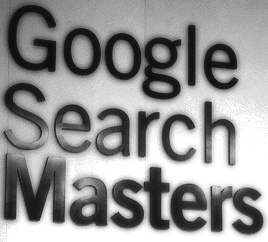
Think you know all there is to know about Google search?
I was recently asked a question regarding the use of the asterisk when searching on Google, specifically in conjunction with certain punctuation.
This person was under the impression that if you used the equal sign on either side of an asterisk when searching Google, it would function as a multiple word wildcard operator. For example, searching for [linux=*=administrator] should return results of linux system administrator, linux systems administrator, linux network administrator, linux server administrator, etc.
The short answer is that Google ignores most punctuation, and that there is no need to combine the asterisk with any other punctuation or symbols for it to perform as a single or multiple word wildcard.
The long answer is much more interesting. I decided to perform some experiments with Google’s wildcard asterisk and I uncovered a few oddities and unsolved mysteries. I’m curious if you might be able to shed some light on them. But first, I will show you exactly how you can make good use of Google’s asterisk when searching for resumes on the Internet, as well as when X-Ray searching LinkedIn and Twitter.
The Asterisk Operator on Google
Google treats the asterisk (*) as a placeholder for 1 or more words – it can also be referred to as a single or multiple word wildcard operator, because Google treats the asterisk as a placeholder for any unknown term(s) for which it tries to find the best match(es). Essentially, Google “fills in the blanks” wherever there is an asterisk.
According to Google, here is an example of proper syntax when leveraging the asterisk: [ Obama voted * on the * bill ] – notice how there is a space on either side of each asterisk.
Searching for Candidates using Google’s Asterisk Operator
Judicious use of the asterisk on Google when searching for candidates can yield great results and can increase relevance.
For example, if you are looking for someone who has experience administering linux, you could search for rigid phrases such as “administered linux,” or perhaps “linux systems administrator.” However, utilizing the asterisk on Google, you can add greater flexibility in your search and capture a wider variety and a larger number of results.
(intitle:resume OR inurl:resume) “~administer * linux” -job -jobs
Notice the variety of the results of this search:

The variety of relevant phrases that Google’s wildcard operator returns from just these 6 results is eye-opening. No sourcer or recruiter would sit down and be able to think of every conceivable phrase a candidate could say to represent their linux administration experience. With the proper use of Google’s asterisk search operator, there’s no need to, because the asterisk “fills in the blanks.”
When it comes to leveraging the asterisk in a Google search, don’t think in terms of single keywords – think about sentences and phrases that candidates might use to express their responsibilities.
Using Google’s Asterisk in a LinkedIn X-Ray Search
You can make use of Google’s wildcard operator to target current titles when performing an X-Ray search.
For example:
site:linkedin.com (inurl:in OR inurl:pub) -intitle:directory (“current * project manager” OR “current * program manager”)

This is how the asterisk is put to work – it “bridges the gap” across the word “current” to the current title – in this case – “Program Manager.”
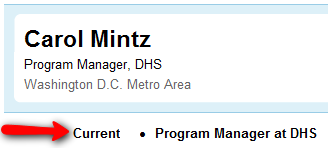
Please note, however, that this technique is not flawless. In my testing, while this approach does find many profiles with the target current title, it does not actually find EVERY profile with the target current title. You can test this for yourself by running back-to-back external X-Ray and internal LinkedIn searches.
LinkedIn Phrase Searching
Of course you can also use the asterisk to search for flexible phrases just as we did with the Linux admin search above.
For example:
site:linkedin.com (inurl:in OR inurl:pub) -intitle:directory engineer “* cisco routers”
Instead of just searching for “cisco” and “router” or “routers” and simply matching keywords, we’re actually trying to target PHRASES that communicate responsibility. As sourcers and recruiters – you should not be looking just for keywords, you should really be looking for what people have DONE, not just mentions of search terms. Below you can see how using the asterisk has yielded results of people talking about configuring and implementing routers:

Google essentially “filled in the blank” of the asterisk preceding the two words of “cisco routers.” Clicking on a “cached” result shows exactly how our use of the asterisk pulled a phrase on this LinkedIn profile of someone who has been responsible for configuring Cisco routers.
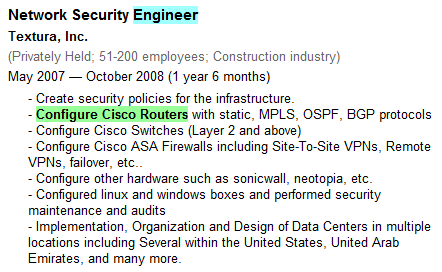
Using Google’s Asterisk in a Twitter X-Ray Search
When X-Ray searching Twitter, you can use Google’s asterisk to search specifically for words mentioned in the “Bio” field. This is especially helpful because this is the place where you can more reliably find titles and professional skills.
Let’s try looking for people who mention the word “accountant” in their Twitter bio:
site:twitter.com “bio * accountant”
Click here for the 579 results.

Clicking into a result, we can see how this worked beautifully:

You can go a step further and try using two asterisks to reach further into the bio field:
site:twitter.com “bio * * accountant”
Click here for the 468 results. Notice the lack of overlap in the results with the single asterisk search above.

Remember that Google treats the asterisk as a single or multiple word wildcard. Exactly how many words? I am not sure, and Google’s documentation does not appear to say. Using 2 asterisks in the example above essentially extends the distance between the word “bio” and the word “accountant” – inserting more “blanks” for Google to fill in.
And you can keep adding more. For example, let’s try 3 asterisks:
site:twitter.com “bio * * * accountant”
Click here for the 350 results.

Punctuation in Google Search Strings
Now let’s get back to the initial question about combining the asterisk with punctuation.
Google’s basic help page USED to explain that “with some exceptions, punctuation is ignored (that is, you can’t search for @#$%^&*()=+[]\ and other special characters).” I say “USED” to because I can no longer find that specific statement on Google’s basic or advanced help pages, although it can be found quoted in the web search help forum.
Interestingly, if you search Google’s web search help for “punctuation,” the second result is this:

There’s the phrase I’m looking for – however, when you click on the result, it takes you to this page, which doesn’t actually contain the phrase “with some exceptions, punctuation is ignored (that is, you can’t search for @#$%^&*()=+[]\ and other special characters).”
Weird. I wonder why it’s been removed. No doubt due to my Google-thinks-I’m-not-human search experiments. :-)

In any event, Google is supposed to ignore the equal sign, along with @#$%^&*()+[]\. Remember that list – I’m going to show you that Google doesn’t actually ignore all of those symbols/punctuation marks.
Experimenting with the Asterisk
While Google states that you can’t search FOR the equal sign, I decided to do a little testing to see exactly what Google makes of it if you do use it on either side of an asterisk in a query, just like the person who asked me the initial question apparently did (e.g. linux=*=administrator).
I also tried several different searches using some of the other supposedly ignored punctuation in combination with the asterisk, as well as one scenario where I didn’t use any spaces on either side of the asterisk – just to see what would happen. Yeah – this is what I do in my spare time. I’m that guy.
Search #1 =*=
(inurl:resume | intitle:resume) linux=*=administrator (301 OR 703) -job -jobs

Search #2 /*/
(inurl:resume | intitle:resume) linux/*/administrator 301 -job -jobs
1 result– the same as the one from search #1

Search #3 Single space on either side of the asterisk, using quotes
In addition, I added quotation marks around the “linux * administrator” phrase to more closely approximate searches #1 and #2 above, as there is technically no space on either side of the asterisk, keeping it a single phrase.
(inurl:resume | intitle:resume) “linux * administrator” 301 -job -jobs
1 result again, same as before.

So this shows that Google does in fact ignore the equal sign and the slash – it doesn’t have any effect on the asterisk/wild card operator over a space.
However – things get a little interesting when you try the question mark.
Search #4 ?*?
(inurl:resume | intitle:resume) linux?*?administrator 301 -job -jobs
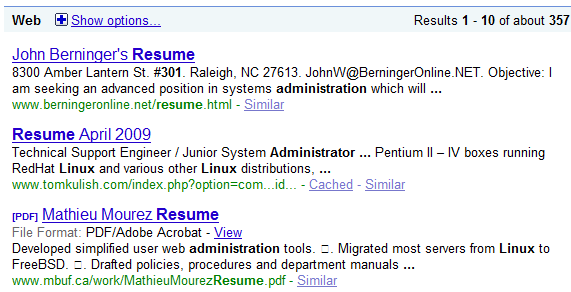
Okay – we go from 1 result with the = and the /, as well as spaces enclosed by quotation marks, to 357 results simply by using a question mark? Something is going on with the question mark, but I am not sure exactly what. However -let’s remember that Google doesn’t explicitly mention the question mark in their list of ignored punctuation: @#$%^&*()=+[]\.
So the question mark really is a question mark. Yeah, I went there.
Do you have any insight as to why Google treats the question mark (?) any differently than an equal sign or a slash?
Search #5 A single space on either side of the asterisk, without quotes
(inurl:resume | intitle:resume) linux * administrator 301 -job -jobs
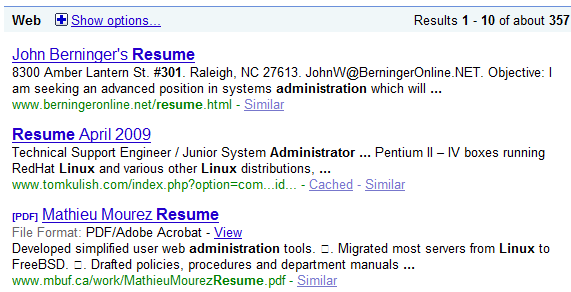
These results provide SOME insight, because they return the same number of results as search #4 that used the question marks. This leads me to believe that the question mark is actually ignored, because it returns the same number of results as the string that simply has spaces on either side of the asterisk.
However, if the question mark is ignored, then how can Google return fewer/different results in searches #1 and #2 that use the = and the /, which should also be ignored?
More questions than answers here. Have any insight?
Search #6 No space on either side of the asterisk
(inurl:resume | intitle:resume) linux*administrator 301 -job -jobs
499 results this time. Interesting, yes?

This reveals another mystery, because I can’t explain exactly why linux*administrator (no spaces) and linux * administrator (single space on either side of the asterisk) return different results, let alone why the search with no spaces returns broader results, which is a little counterintuitive considering all we did was eliminate the spaces around the asterisk. If anything, one might assume the results should tighten?
I attached a capture of 3 results from page 10 – notice how far apart the words administrator/administration and Linux are from each other.
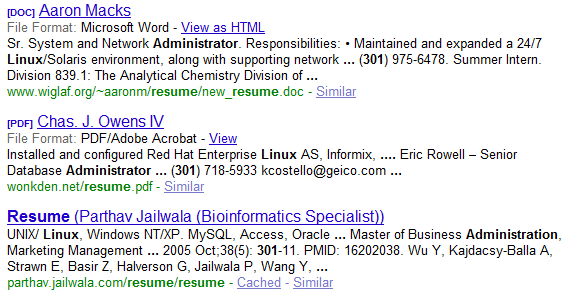
Search #7 &*&
It gets even more interesting. As we’ve seen, Google claims to ignore most punctuation, including the ampersand. However, it certainly does not ignore the &, as evidenced by the fact that this search returns 0 results:
(inurl:resume | intitle:resume) linux&*&administrator 301 -job -jobs

Conclusion
The single/multiple word wildcard operator on Google has many uses – it can help you target current titles with LinkedIn X-Ray searches, search for terms and titles in Twitter bios, and move beyond simply searching for keywords and step into the realm of searching for phrases that suggest actual responsibilities.
As for the combination of punctuation and the asterisk operator, it appears that the = sign (as well as a few other supposedly ignored symbols) actually seem to “bridge the gap” and effectively convert strings employing the asterisk (*) to something very similar to a phrase search using quotation marks (e.g., “linux * administrator”). While the asterisk can represent 1 or more words, when used in conjunction with a phrase search using quotation marks (or, as we have seen with = or / punctuation on either side of a single asterisk), Google returns results where the words on the left of the asterisk are always very close to those on the right of the asterisk – in most cases they are separated by only 1 word.
However, as we have seen – not all symbols are created equal. The linux?*?administrator is not processed the same way as linux=*=administrator. It appears that the ? does not “bridge the gap” of the words on either side of the asterisk as the = sign does, and the results are much looser – resembling the results of linux * administrator without quotations. Without the quotations, Google expands the proximity/distance between the words on the left and the right of the asterisk, in many cases well beyond 3 words.
Do you have any answers to the mysteries revealed in this post? If so – please let me know. Thanks!